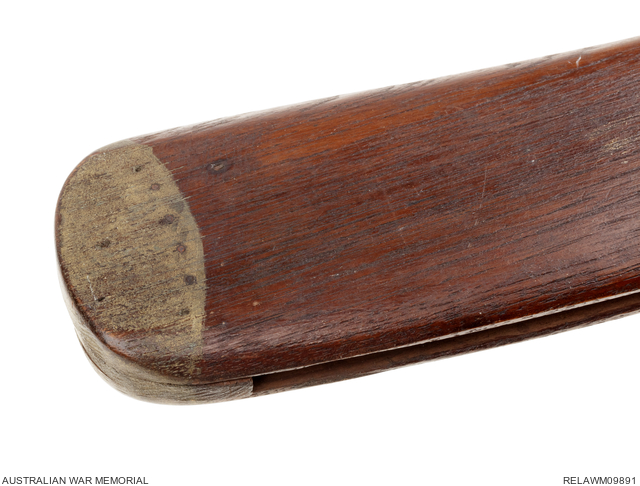| Place | Approximate locations: At sea |
|---|---|
| Accession Number | RELAWM09891 |
| Collection type | Heraldry |
| Object type | Heraldry |
| Physical description | Paint, Wood |
| Maker |
Unknown |
| Date made | c 1916 |
| Conflict |
First World War, 1914-1918 |
| Source credit to | This item has been digitised with funding provided by Commonwealth Government. |
Oversized wooden novelty 'cut thoat razor', HMAT Marathon 'crossing the line ceremony': Captain Charles Henry Linklater, 33rd Battalion, AIF






Oversized wooden 'cutthroat' or 'straight' razor, measuring 73 cm long when fully opened. The wooden 'blade' has been painted silver (although much has worn away) and overpainted with dabs of brown paint or varnish to represent blood. The handle is unpainted wood, excluding the ends, which have been painted gold to represent brass reinforcement / decoration.
This novelty oversized wooden razor was among the personal effects returned to Mrs Dorothy Linklater after the death at Messines in June 1917, of her husband, Captain Charles Henry Linklater, of 33rd Battalion, AIF.
The razor was used during a 'crossing the line' ceremony on board HMAT Marathon on Saturday 24 June 1916 during which Linklater, on his second voyage to the war (he had previously served at Gallipoli before being invalided home sick), performed the role of King Neptune after another officer, who had been going to play part, had pulled out.
Two canvas baths were erected and filled with sea water, a stage was built almost level with a bath. Neptune, his wife and followers came out to the stage. His 'court' included Mrs Neptune with baby, a barber and his assistant, men dressed as policemen in black faces, a doctor, a man who walked ahead of him with a 'waddy' (bag filled with straw) and seven men whose roll was to dunk the 'victims' as many times as possible.
Lieutenant William Richard Coombs played Mrs Neptune and was 'got up to perfection', complete with baby. Linklater credited Coombs with the creation of the many jokes and puns used during the ceremony.
Neptune sat in a chair on the stage and the police moved about the ship 'arresting' anyone they knew had not cross the Equator before, tossed them into a bath and ducked them a number of times. The victim was then examined by the 'doctor' to check if he was sane. Then he was handed to the barber's assistant who plastered him with a paste made of flour and water using a whitewash brush. The barber then shaved the victim with this wooden razor before he was ducked again.
The officers went through first, followed by the men. One of the participants, Private Clifford Walshe, recorded in his diary that he was charged with resisting arrest by the police and was sentenced to be shaved and ducked six times and stood on his head. As there were too many people 'crossing the line', not everyone endured the same level of the proceedings. Officers and and the first batch of the men received the most intensive treatment. The rest were just picked up and thrown in the baths. Afterwards, each participant received a certificate conferring their 'Freedom of the Seas'.